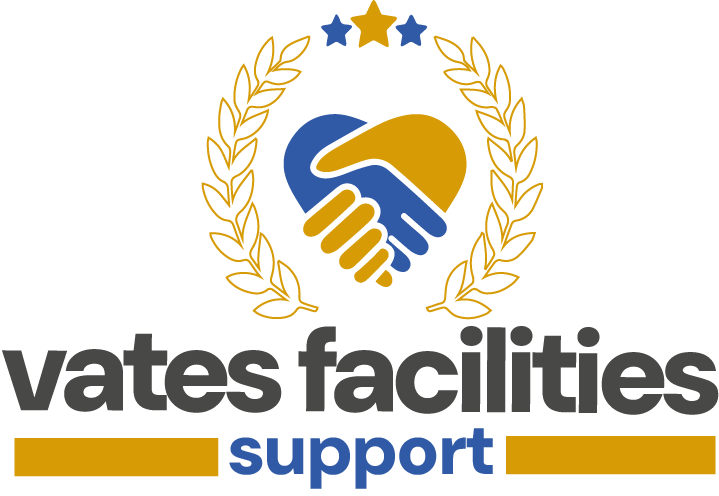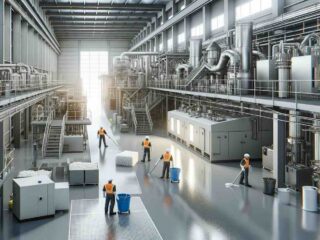5 Unique Strategies for Overcoming Dilemmas in Industrial Cleaning
Are you tired of facing the same old challenges in the industrial cleaning business, wondering how to break free from the cycle of setbacks and frustrations? Imagine having the power to conquer those dilemmas and propel your business to new heights of success. Well, fret no more because we’ve got you covered! In this article, we will delve into the world of industrial cleaning, equipping you with five unique strategies that will revolutionize the way you tackle common hurdles in the industry. These strategies are designed to enhance operational efficiency, improve cleaning outcomes, and ensure a high-quality clean every time.
Key Takeaway of Article
A proactive and well-planned approach, combined with the right tools and techniques, is vital for mitigating challenges and ensuring continued success in the industrial cleaning industry. VATES Facilities Support is at the forefront of provided high value industrial cleaning for industrial facilities in the Kingdom of Bahrain.
Strategy 1: Leveraging Advanced Stain Removal Techniques
Industrial settings are prone to various types of stubborn stains, from oil spills to chemical residues, which can be challenging to remove. Effective stain removal is crucial for maintaining cleanliness and safety standards. This strategy focuses on identifying the type of stain and using appropriate techniques and products to eliminate them effectively.
Advanced Techniques for Stain Removal
Stains in industrial environments can be diverse, requiring tailored approaches for successful removal. Here are some advanced techniques for dealing with common industrial stains:
- Identify the Stain: Different stains require different treatments. Identifying the type of stain is the first step in determining the appropriate cleaning solution. For instance, oil stains need degreasers, while rust stains require acidic cleaners.
- Pre-treat the Stain: Applying a pre-treatment solution can help loosen the stain before the main cleaning process. This step enhances the effectiveness of the cleaning efforts, making it easier to remove the stain completely.
- Use the Right Cleaning Agent: Choosing the right cleaning agent is crucial. For example, enzymatic cleaners are effective for organic stains, while alkaline cleaners work well on grease and oil stains. Always select a product that is designed to tackle the specific type of stain you are dealing with.
- Test Before Applying: Before applying any cleaning agent to the stained area, it is important to test it on a small, inconspicuous spot. This ensures that the cleaning agent will not cause damage or discoloration to the surface.
- Employ Mechanical Action: Sometimes, mechanical action such as scrubbing or using a power washer can significantly enhance the stain removal process. Combining mechanical action with the right chemical agent often yields the best results.
Strategy 2: Effective Odor Control Solutions
Unpleasant odors are a common issue in industrial settings, often resulting from chemical processes, waste materials, and prolonged activities. Addressing odor problems is essential for creating a comfortable and safe working environment. This strategy explores various methods to manage and eliminate odors effectively.
Solutions for Odor Control
Controlling odors in industrial environments requires a multifaceted approach. Here are some effective solutions to consider:
- Deep Cleaning: Regularly deep cleaning the affected areas with strong disinfectants helps eliminate bacteria and odor-causing agents. Deep cleaning should include hard-to-reach places where odor-causing residues might accumulate.
- Proper Ventilation: Ensuring proper ventilation in the facility is crucial for allowing fresh air circulation and reducing the buildup of odors. Installing industrial-grade exhaust fans and maintaining HVAC systems can significantly improve air quality.
- Odor Neutralizers: Utilize odor neutralizers or air fresheners specifically formulated for industrial environments. These products can effectively mask or eliminate unpleasant smells, making the workspace more pleasant.
- Identify the Source: Identifying the source of the odor is essential for addressing it directly. It could be a hidden mold issue, a sewage problem, or decaying organic matter. Once identified, take appropriate measures to eliminate the source.
- Use of Activated Carbon Filters: Activated carbon filters are highly effective in absorbing and neutralizing odors. Installing these filters in strategic locations can help control persistent odors in industrial settings.
Strategy 3: Managing Challenges in High-Traffic Areas
High-traffic areas in industrial facilities are prone to heavy soiling and faster wear and tear. Keeping these areas clean and well-maintained is vital for safety and operational efficiency. This strategy provides insights into managing the unique challenges associated with high-traffic areas.
Techniques for High-Traffic Area Management
Maintaining cleanliness in high-traffic areas requires strategic planning and execution. Here are some techniques to consider:
- Regular Maintenance: Implementing a frequent and thorough cleaning schedule for high-traffic areas helps prevent dirt and grime buildup. Regular maintenance ensures that these areas remain clean and safe for workers and visitors.
- Strategic Floor Mats: Placing high-quality entry mats at entrances and exits can significantly reduce the amount of dirt and debris that gets tracked into the facility. These mats should be cleaned and maintained regularly to maximize their effectiveness.
- Stain-Resistant Treatments: Consider applying stain-resistant treatments to flooring surfaces in high-traffic areas. These treatments create a protective barrier that makes it easier to clean spills and stains, extending the lifespan of the flooring.
- Quick Response to Spills: Training your cleaning staff to promptly respond to spills in high-traffic areas is crucial. Immediate action can prevent staining and slipping hazards, maintaining a safe environment.
- Use of Durable Cleaning Equipment: Investing in durable and efficient cleaning equipment, such as ride-on scrubbers and high-capacity vacuum cleaners, can enhance the cleaning process in high-traffic areas. These machines are designed to handle the rigors of frequent use, ensuring consistent results.
Strategy 4: Implementing Preventive Maintenance Practices
Prevention is always better than cure, especially in industrial cleaning. Preventive maintenance practices help minimize cleaning dilemmas and extend the life of equipment and facilities. This strategy emphasizes the importance of regular inspections, proactive repairs, and thorough training for cleaning staff.
Best Practices for Preventive Maintenance
Incorporating preventive maintenance into your cleaning routine can lead to significant long-term benefits. Here are some best practices to follow:
- Regular Inspections: Conduct routine inspections to identify potential issues before they escalate. Regular checks can help detect early signs of wear and tear, allowing for timely intervention.
- Establish Cleaning Protocols: Develop comprehensive cleaning protocols tailored to your facility’s needs. Clearly define responsibilities and expectations for your cleaning staff to ensure consistency and efficiency.
- Proactive Repairs: Staying on top of maintenance and repairs is essential for preventing larger problems from occurring. Fixing small issues promptly can save time and money in the long run, avoiding costly repairs or replacements.
- Staff Training: Providing thorough training to your cleaning staff on best practices, equipment usage, and safety protocols is crucial. Well-trained employees are more likely to perform their duties efficiently and effectively, contributing to overall operational success.
- Use of Quality Products: Investing in high-quality cleaning products and equipment can make a significant difference in the maintenance of your facility. Quality products are often more effective and longer-lasting, reducing the need for frequent replacements.
Strategy 5: Utilizing Specialized Cleaning Equipment
Industrial cleaning often requires specialized equipment to tackle the unique challenges presented by different environments. This strategy focuses on the importance of using the right tools and technologies to achieve optimal cleaning results.
Importance of Specialized Equipment for Industrial cleaning
Specialized cleaning equipment can significantly enhance the efficiency and effectiveness of your cleaning operations. Here are some key considerations:
- Advanced Cleaning Machines: Investing in advanced cleaning machines, such as floor scrubbers, steam cleaners, and pressure washers, can streamline your cleaning processes. These machines are designed to handle tough cleaning tasks and deliver high-quality results.
- Ergonomic Tools: Using ergonomic cleaning tools can improve worker productivity and reduce the risk of injuries. Tools that are designed for comfort and ease of use can make the cleaning process more efficient and less physically demanding.
- Automated Solutions: Automation is becoming increasingly important in industrial cleaning. Robotic cleaners and automated systems can handle repetitive and time-consuming tasks, allowing your staff to focus on more complex cleaning requirements.
- Innovative Cleaning Agents: Utilizing innovative cleaning agents that are specifically formulated for industrial use can enhance cleaning outcomes. These products are designed to tackle the toughest stains and contaminants, ensuring a thorough clean.
- Regular Equipment Maintenance: Maintaining your cleaning equipment is essential for ensuring its longevity and performance. Regular maintenance checks and timely repairs can prevent breakdowns and ensure that your equipment operates at peak efficiency.
Conclusion
Overcoming common dilemmas in industrial cleaning is crucial for achieving success in the industry. By implementing these five unique strategies—leveraging advanced stain removal techniques, effective odor control solutions, managing challenges in high-traffic areas, implementing preventive maintenance practices, and utilizing specialized cleaning equipment—you can navigate the complexities of industrial cleaning with confidence and efficiency.
FAQs
- How can I effectively remove tough stains in industrial settings?
- Identify the stain, pre-treat it, use the right cleaning agent, and test before applying.
- What are the best ways to control odors in industrial environments?
- Deep cleaning, proper ventilation, using odor neutralizers, and identifying the source of the odor.
- How can I manage cleaning in high-traffic areas?
- Regular maintenance, strategic floor mats, stain-resistant treatments, and quick response to spills.
- What are some preventive maintenance practices for industrial cleaning?
- Regular inspections, establishing cleaning protocols, proactive repairs, and staff training.
- How important is specialized equipment in industrial cleaning?
- Specialized equipment ensures operational efficiency and helps conquer tough cleaning challenges.
For more information or to request our services, visit vfsupport.com or email us at sales@vfsupport.com.



Leave a Reply